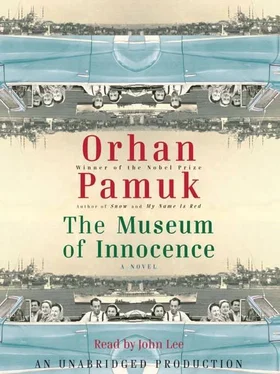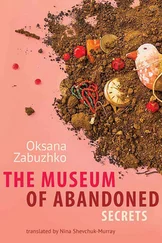Certainly they knew that I did not come calling to watch television, but to be near Füsun, but sometimes to finesse this imperative I would phone ahead, saying to Aunt Nesibe, “Why don’t I come over this evening. They’re showing Pages from History !” But having seized on such a pretext, I had locked myself into a need to be off once the program was over. So at that moment, the television having been turned off, I would sit for a casual while longer, before telling myself, more forcefully now, that I needed to stand up and get going, but my legs would not obey me. In this motionless state I would remain, whether at the table, or on the L-shaped divan, like a figure in a painting, and as I felt the perspiration beading on my brow, many Aristotelian moments would pass, the ticking of the clock punctuating my discomfort, as I exhorted myself, saying, “I’m standing up now!” forty times over, but still to no avail.
Even all these years later this inertia baffles me somewhat, just as I cannot fully comprehend the love that so afflicted me, though I can adduce, perfectly, any number of discrete reasons for my apparent loss of will:
1. Every time I said, “I must get going now,” Tarık Bey or Aunt Nesibe would say with sincerity, “Oh, please stay a little longer, Kemal Bey, we were sitting so nicely!”
2. If they did not, Füsun might give me an enchanting smile, with such a mysterious air that I would be all the more confused.
3. Then someone would begin telling a new story, or bring up a new subject. To get up now, before this new story was told, would be rude, I told myself, and so I would sit there, however uneasily, for twenty minutes more.
4. Coming eye to eye with Füsun I would lose all sense of time, until finally glancing at my watch I’d see that forty, not twenty, minutes had passed, and then I’d say, “Oh, look at the time,” but I still wouldn’t go: I’d just sit there, cursing myself for being so weak, my inertia and shame growing ever deeper, until the moment arrived when it became too heavy to bear.
5. I would search my mind for an excuse to sit there just a bit longer, to give myself a little respite from that burden before going.
6. Tarık Bey might have poured himself another rakı , in which case courtesy perhaps required that I should join him.
7. I would try to ease my departure by using the feeble excuse of waiting for midnight, and then saying, “Oh, it’s midnight already, I really should be going.”
8. I would tell myself that Çetin was perhaps in the middle of some conversation at the coffeehouse, and that he might not be ready either.
9. And anyway, down in the street, just beyond the door, a group of neighborhood youths were gathered, smoking and blabbing, so to leave just then would make me the object of their idle gossip. (It was not a fantasy: Whenever I ran into the neighborhood youths on my way in or out of the Keskin house, they would fall silent, and for years that disturbed me, though seeing me on such good terms with Feridun, they could never as “defenders of the neighborhood” challenge me.)
Feridun’s absence also made me uneasy, oddly more than his presence. I knew already from the way Füsun looked at him that the situation was difficult. But the thought that Feridun might trust his wife implicitly led me to the excruciating conclusion that they might somehow be happily married.
It was far more comforting to explain Feridun’s lack of concern by reference to taboos and traditions. Living as we did in a country where it was unthinkable to show interest in a married woman in front of her parents, and where especially among the poor, and in the provinces, even a sidelong glance could lead to death, it would have been virtually inconceivable to Feridun that it might cross my mind to flirt with Füsun every night as we sat watching television like a happy family. The love I felt, like the dinner table at which we ate, was ringed with so many refinements and prohibitions that even if every fiber in me shouted that I was madly in love with Füsun, we would all be obliged nevertheless to act “as if” there was an absolute certainty that such a love could simply not exist. At times when this occurred to me I would understand that I was able to see Füsun not in spite of all these exquisite customs and proscriptions, but because of them.
Let me offer a counterexample by way of elucidation, as it is central to my story: Had we been living in a modern Western society with more candid relations between men and women, and with the sexes not living in separate realms, my going to the Keskin household four or five times a week would, of course, force everyone eventually to accept that I was coming to see Füsun. The husband would have to be jealous and would be obliged to stop me. And so in such a country my visits could never be so frequent, and neither could my love for Füsun have taken this shape.
On nights when Feridun stayed home, it was less difficult for me to stand up and leave at a suitable time. If, however, Feridun was with his film friends, it could get quite late, the broadcasting having ended, and someone having uttered one of those nightly pleas made out of politeness-“Won’t you have another cup of tea before you go?” or “Sit a little longer, Kemal Bey, please!”-because I would sometimes resolve to time my departure around his return. But not once during those eight years could I decide whether it was better to leave just before he got back or just after.
During the first months it seemed far preferable to depart before Feridun returned. Because in those first moments after he walked in and we came eye to eye, I would feel very, and I mean very, bad. I would have to down at least three more glasses of raki after returning to Nişantaşı just so I could sleep. What is more, getting up the moment Feridun arrived was as good as suggesting that I disliked him and, even worse, as revealing that I was there for Füsun. Hence the habit of my remaining at least half an hour after Feridun’s return, despite magnifying both my inhibitions and shame. Better to suffer these feelings than to expose my guilt by avoiding him. I wouldn’t follow those dastardly Casanovas in European novels who openly court the countess and scamper out of the castle moments before the count’s return! Of course, as an alternative to leaving before Feridun got back, I could have allowed a longish interval between my departure and his arrival. But this would have meant leaving the Keskin house early. And that I could not do. I had trouble leaving late. I had trouble leaving early.
10. If I did wait for Feridun, we might have a chat about this screenplay business. In fact, I tried this a few times; when Feridun got home, I tried to talk to him.
“There’s now a faster way of getting cleared by the board of censors, Feridun. Have you heard?” I said once. If I didn’t use those exact words, I said something similar, leading to an icy silence at the table.
“There was a meeting with the Erler Films people at Panayot’s coffeehouse,” said Feridun.
Then he kissed Füsun in the half-heartfelt, half-routine way that husbands in American films kiss their wives when they get home from work. Sometimes I would see from the way Füsun greeted his embrace with her own that these kisses were genuine, and it would hit me very hard.
Some nights Feridun would sit with us and have supper, but most evenings found him at the cafés with the writers, draftsmen, stagehands, and cameramen of the film world, or visiting them at home. He had been drawn into a communal life with noisy, gossipy people who lacked inner calm and were never without a reason to argue with one another. Feridun had in fact come to attach disproportionate importance to the dreams and disputes of these associates with whom he drank and dined so often, so that while his film friends’ passing pleasures brought him instant happiness, their lingering despair left him no less instantly grief-stricken. When he was so afflicted I put my mind at ease and would not worry that my evening visits were keeping Füsun from going out with her husband and enjoying life. Ordinarily, profiting from the nights when I wasn’t visiting, Füsun would go out to Beyoğlu once or twice a week, radiant in a chic blouse and adorned with one of the butterfly brooches I had bought her, and with her husband she would sit for hours in a place like the Pelür or Perde, a detailed report of which would come to me from Feridun on the very next visit.
Читать дальше












